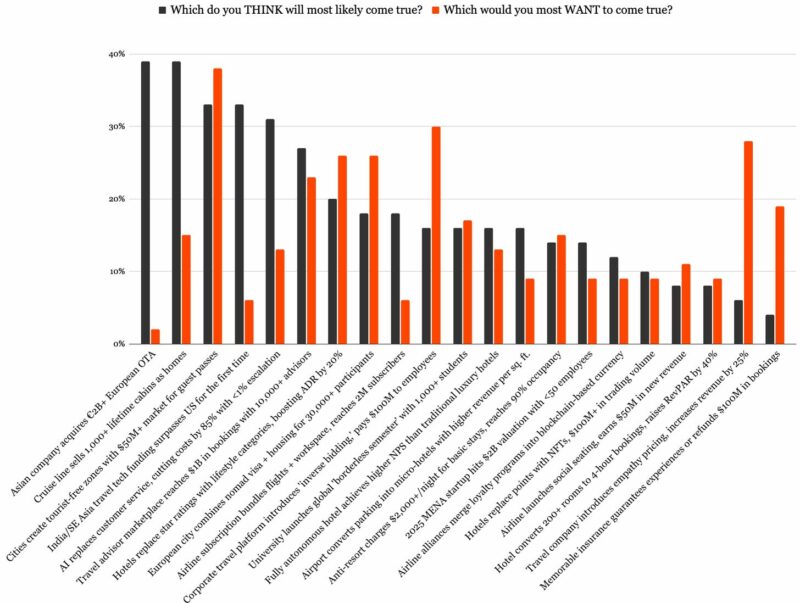
In the 1990s, I became involved in shaping various real estate ownership and operating agreements, exploring how to separate the brick-and-mortar side from the day-to-day running of a hotel. While hotels will always be asset-heavy by definition, the ownership of those assets has steadily shifted from hotel companies to specialized real estate firms, enabling many hotel operators to adopt a more asset-light model.
Today, these three forces—Revenue Management, Distribution Channel Shifts, and Asset-Light Business Models—remain the driving force behind hotel profitability. Below is an overview of why they matter, followed by specific recommendations for ensuring you maximize the profit potential as we head into 2025.
1. Revenue Management
What It Was Like Before
Hotels typically had fixed rates or seasonal price changes, which limited their ability to optimize revenue based on daily market trends. Many decisions were made based on gut feelings or incomplete information, and forecasting relied on past demand.
How It Changed the Way Hotels Work
As revenue management gained traction, it introduced real-time price adjustments based on changes in demand, competition, and market conditions. Hotels began analyzing historical data, market indicators, and guest segments to optimize both occupancy and rates. This led to the key performance indicator RevPAR (Revenue Per Available Room), which is still the most important KPI in the hotel industry. Revenue teams started collaborating closely with sales, marketing, and operations, fostering a more holistic approach to pricing and inventory decisions.
What Will Happen in the Next Five Years
The concept of revenue management is expanding beyond room revenue to encompass F&B outlets, meeting spaces, spa services, and parking, emphasizing optimizing every source of income. Automated forecasting, real-time rate updates, and hyper-accurate predictions will soon become standard practice, fueled by large data sets on customer behavior and market trends. Hotels will also rely on guest data and AI to deliver custom offers—such as upgrades or special packages—tailored to each guest’s preferences. Finally, revenue management will increasingly serve as the unifying strategy across multiple departments, aligning goals and ensuring a cohesive brand experience.
Capturing All the Benefits of Revenue Management in 2025
- Invest in Advanced Business Intelligence
- Use a strong BI tool to understand what makes your hotel successful, revealing trends and connections behind revenue performance.
- Combine data from PMS, RMS, and other internal systems with data from external systems to create a single source of truth, allowing for real-time, data-driven decisions.
- Adopt a “Total Revenue” Mindset Focused on the Guest
- Concentrate on the entire guest journey, from pre-arrival marketing to post-stay engagement, instead of managing separate departments.
- Include F&B, spa, sales, and marketing teams in joint revenue discussions, ensuring each department understands its role in maximizing every guest interaction.
- Foster a Culture of Data Quality and Data-Driven Decisions
- Emphasize accurate data collection and continuous learning so every team member can effectively interpret and act on insights.
- Make key revenue metrics visible throughout the organization to encourage alignment, accountability, and ongoing improvement.
2. Distribution & Channel Shift
What It Was Like Before
People mainly booked hotels through direct calls, walk-ins, and travel agents for bookings. Before the internet became widespread, most sales happened offline. This meant fewer marketing options and little price transparency for customers.
How It Changed the Way Hotels Work
What Will Happen in the Next Five Years
Hotels will refine their channel mix by balancing OTAs, GDS, metasearch platforms, and direct booking channels to achieve optimal profitability. Meanwhile, new digital players, from social media booking to AI-driven search engines and AI agents, will continue to emerge, sparking unique partnerships such as influencer marketing. As these digital touchpoints evolve, hotels will increasingly tailor their online interactions, including remarketing ads and personalized offers, to drive higher conversion rates. Finally, the lines between marketing and distribution will continue to blur as strategies like SEO and content marketing become deeply integrated with channel management.
Capturing All the Benefits of Distribution & Channel Shift in 2025
- Optimize Your Channel Mix
- Regularly audit each channel’s cost of acquisition against its revenue contribution to find the perfect balance.
- Explore emerging platforms (e.g., mobile-centric booking apps) and leverage metasearch tools to reach new segments.
- Collaborate selectively with OTAs, negotiate favorable commission structures (which is probably impossible), and participate in targeted marketing campaigns while closely monitoring customer acquisition costs.
- Invest in Seamless Online Experiences
- Streamline your website’s booking engine and checkout process to reduce guest friction and abandonment rates.
- Employ chatbots or virtual assistants for round-the-clock engagement and swift issue resolution.
- Ensure accurate rate displays and user-friendly interfaces across all digital touchpoints.
- Strengthen Direct Booking Initiatives
- Develop compelling offerings for guests who book through your website or app. Without additional information about the guest, it is much more challenging to upsell or cross-sell to maximize revenue per guest.
- Use targeted email campaigns and personalized retargeting ads to encourage repeat visits and direct conversions.
- Maintain consistent branding and messaging across marketing channels to reinforce the value of booking directly.
3. Asset-Light Business Models
What It Was Like Before
In the past, major hotel brands owned both the buildings and the operations, which required significant capital investments and carried high financial risks. Due to these considerable upfront costs, portfolio growth was slower, and profitability depended on efficiently managing the properties they owned.
How It Changed the Way Hotels Work
Brands found they could grow more quickly and with less financial risk by franchising their names or managing properties for owners. Institutional investors and REITs (Real Estate Investment Trusts) began owning more hotel buildings. Meanwhile, hotel operators concentrated on branding, marketing, and operations. They focused on enhancing the guest experience, marketing, and revenue strategies rather than investing capital in real estate assets.
What Will Happen in the Next Five Years
Hotel groups will increasingly create or acquire niche brands with unique identities, appealing to different guest segments while avoiding the capital-intensive burden of real estate ownership. Meanwhile, more creative joint-venture partnerships, leases, and management contracts will emerge as operators seek data-driven ways to assure owners of strong returns. As operators outsource tasks like housekeeping or IT to specialized vendors, they focus more on brand-building and guest engagement. At the same time, real estate firms will gain more significant influence as investors demand higher returns and robust performance metrics, driving closer collaboration between owners and operators.
Capturing All the Benefits of Asset-Light Business Models in 2025
- Build Strong Owner-Operator Relationships
- Communicate with real estate partners about performance metrics, ROI, and market trends.
- Provide regular, data-driven performance reports to establish trust and transparency.
- Focus on the Guest Experience
- Allocate resources to enhance guest satisfaction and operational excellence.
- Leverage technology (e.g., mobile apps, innovative room features) to remain competitive and create memorable guest journeys.
- Optimize Management & Franchise Agreements (Including Rental Contracts if Operating Under Own Risk)
- Negotiate terms that fairly align risk and reward between owners and operators.
- Continuously review and update agreements to reflect evolving market conditions and cost structures.
Conclusion
Over the past few decades, the hotel industry has undergone significant changes in room pricing, marketing, and operations. In the 1980s, sophisticated revenue management emerged. The 1990s saw the rise of online distribution, and over time, the industry has shifted towards asset-light business models. Despite changing technology, guest expectations, and economic conditions, these three key forces—Revenue Management, Distribution & Channel Shift, and Asset-Light Business Models—remain as relevant as ever. They continue to shape how hotels generate profit and how operators interact with guests, owners, and the broader marketplace.
As you prepare for the next five years, it’s crucial to recognize that while these trends may look different than they did 20 or 30 years ago, their underlying principles endure: aligning technology with guest-centric strategies, staying nimble in the face of distribution challenges, and focusing on operational excellence rather than capital-intensive assets. By leaning into these trends, forward-thinking hoteliers can position themselves at the forefront of innovation and profitability—even amid ongoing industry disruptions.
Key Takeaways
- Revenue Management Is Everyone’s Responsibility
- To maximize total revenue, involve multiple departments, including F&B, sales, and marketing.
- Invest in business intelligence tools and align your entire team around data-driven decisions.
- Direct Bookings and Channel Strategy Go Hand in Hand
- Strive for a balanced mix of distribution channels, using OTAs where it makes financial sense but prioritizing direct bookings to retain more revenue and “own” the guest.
- Make offers compelling, targeted communication, and frictionless booking experiences to capture and retain guests.
- Asset-Light Models Accelerate Growth and Flexibility
- Hotels don’t need to own the building to deliver an excellent guest experience.
- By focusing on brand value and operational excellence, operators can scale faster, minimize risk, and keep pace with shifting market demands.
- Invest in People and Technology
- Even the best tech tools require skilled teams who understand how to interpret data and make strategic decisions.
- Continuous learning and cross-departmental collaboration are critical for remaining agile and innovative.
- Preparation for 2025 and Beyond
- Embrace personalization at every touchpoint, from revenue management to marketing campaigns.
- Foster a culture of ongoing improvement and transparency, internally with your team and externally with owners, investors, and guests.
By embedding these principles into your strategic plans, you’ll stay grounded in the lasting foundations of hospitality. Even if the industry doesn’t change as quickly as some predict, advanced revenue management, a balanced distribution strategy, and asset-light operations are still essential. By continuously refining these core areas, you’ll be well-positioned to maintain profitability, stay competitive, and adapt to changes.







